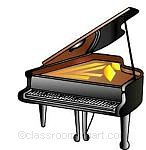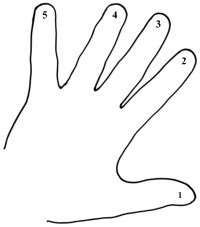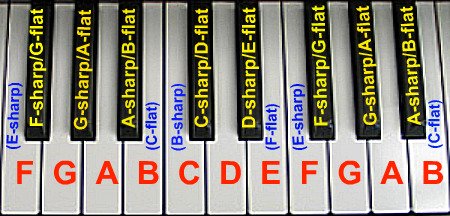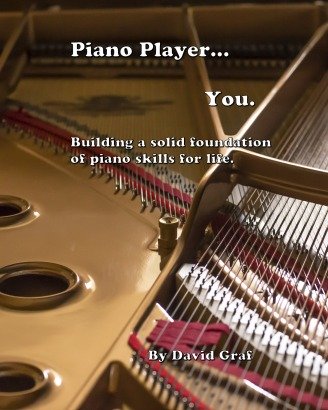The purpose of this website: helping you learn to play the piano. Building a strong foundation of piano-playing skills will lead to a lifetime of piano-playing joy.
Learn Piano

You can learn piano with a combination of motivation, commitment, and well-organized, quality instruction. You must come up with the first two and find a good teacher for the latter. In lieu of a good teacher, this site offers some basic concepts to get you started. Also, a new e-book is now available which contains an extremely helpful bird's-eye view of a fundamentally sound piano journey: Piano Player... You. (See link below)
To learn piano, begin with a commitment to daily practicing and a willingness to master the skills and concepts at every level before moving on. Learning piano is a long-term endeavor and every element takes time and practice.
If you go into your piano-playing career thinking it is all about playing beautiful music, you will quickly become frustrated.
Absolutely, playing beautiful music is a great goal for everyone. But, at first, the great bulk of your time at the piano will be spent just trying to master the hundreds of little details needed to develop your skills and understanding.
Readjust your thinking so that you simply enjoy the actual learning and working process, and you will be able to persevere and reach the point where beautiful music starts happening while you work.
For a more complete understanding of how to build your piano-playing foundation, read
For the most direct, organized, and progressive path to learning to play the piano, start
the Piano Skills Foundation series of piano lessons.
(Advertisement)
Learn piano... for starters: piano fingering
Here are the piano finger numbers:

Next: know your keyboard
At the beginning, to learn piano you must first get to know your keyboard. The best way to start is to learn a bunch of tunes, even before learning to read music. Go to "Free Piano Lessons" for a listing of tunes and learn as many as you can.

Next: learn the notes
(also part of "Knowing Your Keyboard")
Learning the notes (essentially, the note names)will help prepare you for reading and understanding all the music theory as it applies to the keyboard. This is a huge part of "knowing your keyboard". (See "Piano Notes" and "Piano Notes Chart" .)

Next: begin learning scales and chords
Scales and chords comprise the basic material upon which western music is built. Learning and mastering the 36 "master" scales (12 major scales, 12 melodic minor scales, 12 harmonic minor scales) and their fingerings will give you a deeper understanding of the music you play. Also, it will help you develop your feel for the keyboard and your technique in ways nothing else can as you learn piano.
Learning all the major and minor triads (3-note chords) would be a great start to developing your music/piano/keyboard vocabulary and teach your hands and mind the many different shapes on the piano. These 24 chords are just the beginning, but they are so foundational that every pianist should no them inside and out.
For all the basics on scales and chords, go to
"Piano Scales"
and
"Piano Chords"
.
Next: begin learning how to read music
If you want to learn piano, you ought to learn to read music.
The piano is the perfect instrument for learning how to read music. Plus, learning to read music at the piano opens up a whole world of music to a pianist. Once you become a proficient music reader, the sky's the limit in regard to style, genre, level..., everything.
So much music is available to the pianist these days that a pianist would have to play and read non-stop for hundreds of years to play it all (this is just an educated estimate, on my part).
For ideas on how to start learning to read at the piano, go to
"Reading Music"
.
Next: learn and memorize some piano music (build a repertoire)
As you work on your keyboard confidence, your scales & chords, and your music reading, you'll find one of the most enjoyable activities at the piano is learning "repertoire". This is musician-speak for "pieces I have memorized and can sit down and play at any given moment."
Concert pianists have a huge repertoire of pieces they can play and perform (and most of them practice 4-6 hours per day to maintain this repertoire). Also, pianists who play in lounges, or at parties, or department stores, etc... usually have a tremendous number of "tunes" and piano pieces they know and play regularly.
The rest of us who constitute the piano-playing public (amateurs who only get to practice 4 or 5 days per week, for about 30-45 minutes at a time) are lucky to maintain 2 or 3 pieces "ready to play".
However, it is not important how many tunes one can play, but how much one enjoys working on the music which is important.
Thus, you should always have one or two good pieces to work on, at your level, to feed your musical appetite, and to motivate you to continue developing your ever-growing piano skills.
To find just about any piece, at any level, go to "Sheet Music Plus" and shop away. You can also find plenty of great music at your local music retailer. (Knowing that this is a daunting task, I hope to have a page up soon, to help give music repertoire ideas to pianists of all levels.)
To learn how to practice your pieces, go to "How To Practice Piano" .
All of the items listed above are necessary to learn piano. As you can see, this means time, dedication, patience, perseverance, discipline, and passion.
So what are you waiting for?
For some, the academic side of piano is fun to explore. If this is you, you may want to check out Wikipedia's Music Theory page.

If you want to see a blueprint for a successful piano journey...
read
"Piano Player... You"
A guide to building a solid and complete piano-playing foundation.
-Click here to learn more about this e-book-
If you would like a step-by-step guide to help you on your piano journey...
start working through
"The Piano Skills Foundation" piano lessons
-Click here to learn more about this piano course-
Return from "Learn Piano" to "How To Play Piano"
Looking for some piano music?
I have found Sheet Music Plus to be a fantastic resource for piano books & other materials. And they have instant digital downloads for thousands of individual pieces.
3 Ways To Support This Website
If you enjoy using true-piano-lessons.com and would like to help support it:
1. Buy the ebook, "Piano Player... You"
2. Purchase "Piano Skills Foundation"
3.Donation
